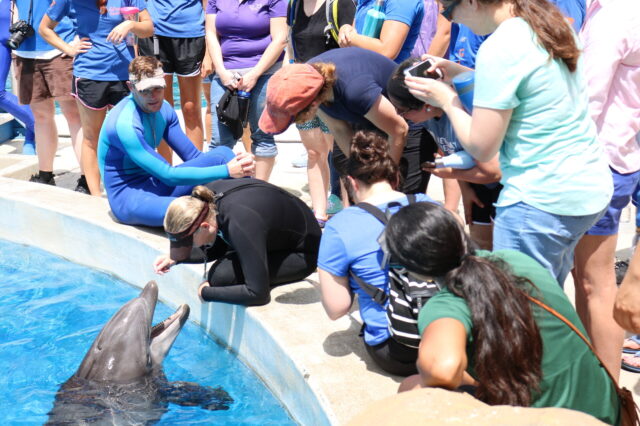SeaVet: Teaching students about 70 percent of the surface of the planet

For veterinary students and veterinarians, a unique course at the University of Florida College of Veterinary Medicine is a way to give aquatic animal enthusiasts a fin up on their competition.
No other veterinary medical college in the world offers a comprehensive program for specializing in aquatic or marine mammal medicine, according to the International Association for Aquatic Animal Medicine, or IAAAM. The UF veterinary college is alone in providing students and veterinarians from around the world supplemental education in this niche profession through the SeaVet Clinical Training course.
This nine-day program, which has been offered at UF for about a decade, includes didactic lectures on topics ranging from sea turtle medicine to clinical ophthalmology as well as on-site visits to aquariums, zoos and Sea World Orlando.
“You have world-famous marine mammal anesthesiologists and ophthalmologists, the best of the best in the field that are teaching this small set of students,” said Claire Erlacher-Reid, D.V.M., a senior veterinarian at Sea World Orlando, who participated in SeaVet in the late 2000s while a veterinary student at the University of Georgia. She said the program allows students to see how professionals work with these underwater creatures.
The college takes advantage of web-based communication and invites expert speakers from across the country to lead lectures and discussions online. This enables students who are not able to come to Florida to participate.
Elena Graebener came from Germany to experience the course. “In Europe, there are not many possibilities to learn about marine mammals,” she said. While the theoretical background provided is intense, she said it was able to fill gaps from her own exploration in books. The anatomy of manatees, a topic not covered in other programs she has attended, was her favorite part of the course.
Mike Walsh, D.V.M., a clinical associate professor of aquatic animal health at the UF veterinary college and SeaVet’s program organizer, said there are practical aspects of the course.
“Our goal is to not only give them the best education possible, but also to give them a leg up on getting out there into the job market,” said Walsh.
Many students are interested in zoological and aquatic medicine, but there are few positions available, he said. Educational opportunities like SeaVet and continued education will give students a well-rounded exposure to the challenges of the field and create advocates for facility and wildlife species.
When asked which aquatic animal the veterinary students are most like, Walsh laughed and said, “Each one is probably a good representative of someone that’s out there…that’s what we are learning about animals in general. They’re so much like us.”
Visit http://conference.ifas.ufl.edu/seavet/index.html to learn more about SeaVet.
The University of Florida College of Veterinary Medicine is supported through funding from UF Health and the UF Institute of Food and Agricultural Sciences.